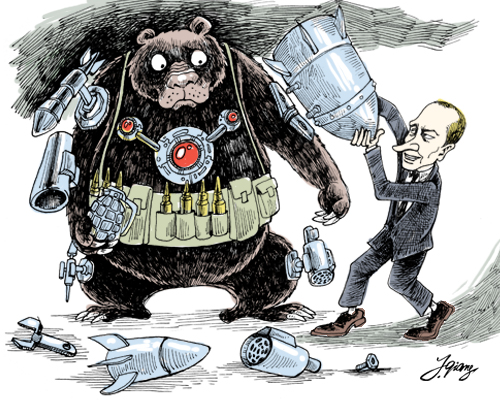Russia shifts focus back to Far East
|
|
|
Conventional Forces [By Jia Qiang/China.org.cn] |
Russia has spent billions of dollars in Vladivostok, the administrative center of its Primorsky Krai, for hosting the 24th Asia-Pacific Economic Cooperation (APEC) summit from Sept. 2 to Sept. 9. Chinese President Hu Jintao will attend the 20th informal APEC leaders’ meeting in the Far Eastern city from Sept. 6 to Sept. 9 at the invitation of Russian President Vladimir Putin.
Russia’s creation of Far East Development Ministry in May this year and hosting of the ongoing APEC summit both indicate that the country stretching across Europe and Asia has shifted its focus back to the economically and strategically significant Russian Far East.
Russia spends billions for APEC summit, plans to build new economic growth corridor
According to preliminary estimates, the Russian government has spent more than 20 billion U.S. dollars refurbishing Vladivostok by building a new airport, new roads and bridges, installing communications equipment, purifying water from underground reservoirs, and other means for hosting the APEC summit.
The center of gravity of world economic activity has been steadily shifting to the Asia-Pacific region over the past few decades, and the economic downturn in recent years has accelerated this trend. Experts predict that the region’s gross domestic product (GDP) growth rate will be much higher than the world average just a few years later.
Putin ordered the creation of Far East Development Ministry in May shortly after his return to the presidency, in hopes that the Russian Far East can develop more rapidly and provide fresh impetus to the country’s overall economic development. Russia has made remarkable economic progress, but its economy remains overly dependent on energy exports.
Facing threat from US and Japan, Russia attaches increasing importance to Far East
The shift of Russia’s focus back to its Far East deserves special attention in the context of the United States’ “return” to the Asia-Pacific region.
However, Russian Ambassador to China Sergey Razov believes the United States has never left the Asia-Pacific region. “From a geographical, political, and historical perspective, the United States has always been part of the Asia-Pacific region, and should contribute to peace and stability in the region,” he said.
“Asia-Pacific countries account for 45 percent of global weapons procurement. Many countries in the region are arming themselves. However, Russia believes that issues threatening the region’s peace, security, and stability should be addressed through political means, consultations, and negotiations rather than through the use of force,” Razov said.
In the opinion of Xiong Hao, scholar of international relations in Tianjin Normal University, the United States' returning to Asia-Pacific will have some impacts in the Far East region and the impacts will become greater and greater. Russia has paid special attention to the Far East in politics, which has close relations with the United States' returning to Asia-Pacific region. In addition, Russia has intense contradiction with Japan on the issue of sovereignty over the South Kuril Islands (Japan calls it "Northern Territories"), which is also one of the reasons.
On July 3, 2012, Russian Prime Minister Dmitry Medvedev inspected the Kunashir Island, one of the disputed islands with Japan. "Judging from Medvedev's boarding the island and the statements made by Russia and Japan, the most important political issue for Russia is the Northern Territories in the Far East region. Territorial issue is the core problem to Russia, which has always been tough in the face of territorial disputes, and so it is very necessary for the state to transfer the attention to the Far East region," Xiong said.


